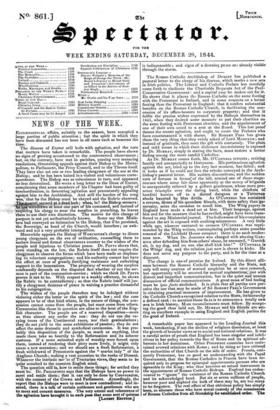NEWS OF THE WEEK.
ECCLESIASTICAL affairs, suitably to the season, have occupied a large portion of public attention ; but the spirit in which they have been discussed has not been in all cases such as beseems the time.
The diocese of Exeter still boils with agitation, and the turn
that matters have taken is remarkable. The people have shown no signs of growing accustomed to the controverted observances ; but, on the contrary, have met in parishes, passing very menacing resolutions' threatening appeals against their Bishop to the Metro- politan, to Parliament, the Privy Council, and to the Throne itself.
They have also set one or two leading clergymen of the see at the Bishop; and he has been baited in a violent and voluminous corre- spondence. The Bishop was as voluminous in turn, and appeared no less determined. He wrote a long letter to the Dean of Exeter, complaining that some members of his Chapter had been guilty of
• insubordination, in fomenting 'agitation and prematurely appealing against him to the Archbishop. And still the burden of his song was, that he the Bishop must be obeyed and the Rubric observed. acemeti ,a dead lock ; when, lo! the Bishop retracts: withdFaVn at least one part of his command, and instead of •• -ieclialring his clergy to wear the surplice in preaching, he leaves
them to use their own discretion. The motive for this change of
purpose is not yet authoritatively known. Some say that Minis- -ters had conveyed an intimation to the Bishop, that if he persisted, the Sovereign, as head of the Church, would interfere; an awk- -ward and not a very probable interposition. Meanwhile appears the Bishop of WORCESTER'S charge to divers young clergymen on the eve of ordination, counselling them to eschew literal and formal observances counter to the wishes of the people and injurious to Christian peace. Dr. Parrs shows that, even standing on the law, the Rubric itself does not require the clergyman to observe the forms which have been made so displeas- ing to reluctant congregations; and his authority cannot but have the effect at once of greatly fortifying resistance and enfeebling support to the innovations. The propriety of wearing the surplice confessedly depends on the disputed fact whether or not the ser- mon is part of the communion-service; which we think Dr. PEPTS proves it not to be. With respect to a weekly offertory, he shows the Rubric to be contradictory ; so that the Rubric itself will jus- tify a clergyman desirous of peace in waiving a practice distasteful to his congregation.
The Wishes of the people therefore may be indulged without
violating either the letter or the spirit of the law ; and the case appears to be of that kind where, in the nature of things, the con- cession cannot come from the people, but must come from others. Ceremonies like those in question are alien to the bent of the Eng- lish character. The people are of a reserved disposition—more so than almost any under the sun: they do not use the va- rying tones of the Continental races, nor their gesticulations ; they do not yield to the same exhibitions of passion; they do not affect the same dramatic and symbolical ceremonies. It was pro- bably this disposition of the people' as much as anything, that made them take so heartily to the Reformation and its soberer customs. If a more animated style of worship were forced upon them, instead of rendering their piety more lively, it might only cause a new secession; and we should see a fresh Reformation, a fresh withdrawal of Protestants against the " scarlet lady " of the Anglican Church; making a vast accession to the ranks of Dissent. Whatever the intrinsic me-'ts of Tractarian views, they seem to be quite unsuited to the common English mind.
The question still is, how to settle these things.; for settled they must be. Dr. PHILLYOTTS says that the Bishops have no power to ;meet and settle them; that it can only be done by Convocation, with the consent of the Crown and Parliament. Accordingly, the report that the Bishops were to meet is now contradicted; and in- stead, there is a talk of certain noblemen and gentlemen who are to meet and concert measures. -The very extent and vehemence of the agitation have brought it to each pus that some sort of quietus
is indispensable ; and signs of a dawning peace arc already visible through the storm.






















